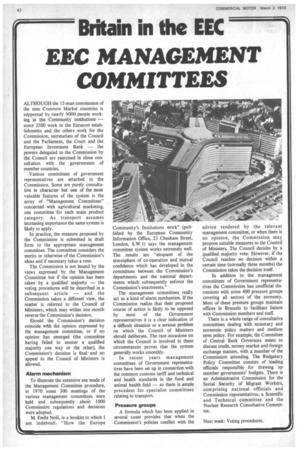EEC MANAGEMENT COMMITTEES
Page 44

If you've noticed an error in this article please click here to report it so we can fix it.
ALTHOUGH the 13-man commission of the nine Common Market countries is sttpported by nearly 9000 people working in the Community institutions — some 2500 work in the Euratom establishments and the others work for the Commission, secretariats of the Council and the Parliament, the Court and the European Investment Bank — the powers delegated to the Commission by the Council are exercised in close consultation with the governments of member countries.
Various committees of government representatives are attached to the Commission. Some are purely consultative in character but one of the most valuable features of the system is the array of "Management Committees" concerned with agricultural marketing, one committee for each main product category. As transport assumes increasing importance the same system is likely to apply.
In practice, the measure proposed by the Commission is submitted in draft form to the appropriate management committee. The committee considers the merits or otherwise of the Commission's ideas and if necessary takes a vote.
The Commission is not bound by the views expressed by the Management Committee but if the opinion has been taken by a qualified majority — the voting procedures will be described in a subsequent article — and the Commission takes a different view, the matter is referred to the Council of Ministers, which may within one month reverse the Commission's decision.
Should the Commission's decision coincide with the opinion expressed by the management committee, or if no opinion has emerged (the committee having failed to muster a qualified majority one way or the other), the Commission's decision is final and no appeal to the Council of Ministers is allowed.
Alarm mechanism To illustrate the extensive use made of the Management Committee procedure, in 1970 some 300 meetings of the various management committees were held and subsequently abotit 1000 Commission regulations and decisions were adopted.
LeM. Emile Noel, in a booklet to which I am indebted: "How the Europe
Community's Institutions work" (published by the European Community Information Office, 23 Chesham Street, London, &WA) says the management committee system works extremely well. The results are "eloquent of the atmosphere of co-operation and mutual confidence which has developed in the committees between the Commission's departments and the national departments which subsequently enforce the Commission's enactments."
The management committees really act as a kind of alarm mechanism. If the Commission realize that their proposed course of action is likely to be opposed by most of the Government representatives it is a clear indication of a difficult situation or a serious problem on which the Council of Ministers should deliberate. The rare occasions on which the Council is involved in these circumstances proves that the system generally works smoothly.
In recent years management committees of Government representatives have been set up in connection with the common customs tariff and technical and health standards in the food and animal health field — so there is ample precedent for specialist committees relating to transport.
Pressure groups A formula which has been applied in several cases provides that when the Commission's policies conflict with the advice tendered by the relevant management committee, or when there is no opinion, the Commission may propose suitable measures to the Council of Ministers. The Council decides by a qualified majority vote. However, if the Council reaches no decision within a certain time (normally three months) the Commission takes the decision itself.
In addition to the management committees of Government representatives the Commission has unofficial discussions with some 400 pressure groups covering all sectors of the economy. Most of these pressure groups maintain offices in Brussels to facilitate liaison with Commission members and staff.
There is a whole range of consultative committees dealing with monetary and economic policy matters and medium term policy. For example, the Committee of Central Bank Governors meets to discuss credit, money market and foreign exchange matters, with a member of the Commission attending. The Budgetary Policy Committee consists of leading officials responsible for drawing up member governments' budgets. There is an Administrative Commission for the Social Security of Migrant Workers, comprising national officials and Commission representatives, a Scientific and Technical committee and the Nuclear Research Consultative Committee.
Next week: Voting procedures.




































































































